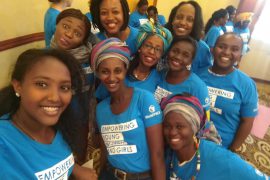During my attendance at this year CSW conference, I had an opportunity to attend one of the most exciting trainings on how to make access to lasting feminine hygiene solutions. We were told on how the Days for Girls International was started, and it was such an inspiration. We all see the problems that girls go through when they are in their menstrual cycle but they are few who take steps toward minimizing those problems such as the founders of Days for Girls International. For those who are less fortunate to have money to buy sanitary pads are forced to stay in isolation for that period, and they are those who are sexually exploited for a sanitary pad.
Before I attended the Days for Girls International training, some of my friends were asking for money or sanitary pad donation, so that they can help students in rural and some urban areas in Mwanza Tanzania. Their aim was to provide sanitary pads to the students so as to increase their attendance in school. But I told them that these donations can only last for a short time and it is not like they are going to continuously supply the students with sanitary pad. What was really needed is a knowledge on how to make their own sanitary, while recalling a proverb “Give man a fish you will feed him for a day; teach a man to fish and you feed him a lifetime.” After I received an email that I will be attending training on how to make sanitary pad, I saw an opportunity to help those students in Mwanza and other places, who face the same problem. The lack of access to sanitary pad is not taken as a real problem most of the time, as people think you only go through that process for few days in a month. But in calculation on average women menstruate 3000 days in their life time. That is more than 8years. Now to think that for those who can’t have access to sanitary pads have to lose 8 years of their life staying indoors as they cannot do anything during that time. It is losing their 8 youthful years whereby they could have made changes during those days, or participate in something that could change their lives for good.
Problems associated with the lack of access to sanitary pads is low attendance of girls in school and for others they become vulnerable to sexual exploitation. They will have sex in exchange for money to buy sanitary pads. Others use a piece of cloth, tissues or magazine during their period, but most of the time these things cannot contain the menstruation and can cause them infections.
There are girls who are not made aware that starting menstruating is a normal thing for women and is a part of growth. So they grow up thinking maybe they are cursed or they are infected by deadliest disease. Parents and teachers need to be there for their young girls especially at this stage so they can make them aware that it is a normal thing for a woman. Making the young girls aware of the changes in their body
During training for Days for Girls we were taught that,. Making of sanitary pads can help women and girls to get out and do their normal activities, but can also be a business for those who are making them.
With the knowledge I got I am going to be a champion of change in my community. Working with the YWCA has given me an opportunity to interact with so many youth. Therefore this will be a platform where I will start intervening on the issues concerning sanitary pads. I want to see the world that every girl and women can have access to sanitary pads, and live behind the days where women stay in isolation because they are in their periods.
By Jesca Mmari, Young Women from YWCA of Tanzania who attended a Girls for Days Training at CSW50






This venture is to train rural women and adolescent girls in and out of school to make, distribute and use single packed handmade re-usable pads packed in a bag-tPads that last more than 12+months locally. Provide inputs, skills and local materials. Excess tPads are sold to community using outreach teams
Make tPads-lasting 12M+Months to solve the MHM challenges that the women/girls are facing for MHM. Selected girls and women in and out of school in the community will be trained in making, use, distribution of single packed handmade reusable tPads from locally available raw materials packed in a bags. Excess tPads made will be sold to the community using outreach teams to improve girls’ school attendance as they will no longer have to miss school during their menstruation period days-train beneficiaries of tPads how to take care, dress, wash, dry and store the tPads in schools and communities and senior women teachers who are responsible for selecting adolescent girls in schools to benefit from free tPads packaged in affordable pay as you go models. Girls who dropped out due to lack of pads will return to school, menstrual related anxiety and stress is eradicated, Rate of infection will go down and are assured that they can get a pad, anytime anywhere with inclusive conversation